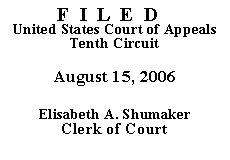

| WESTLAND HOLDINGS, INC.,
a Wyoming corporation,
Plaintiff-Appellee, v. ROSS LAY, Defendant-Appellant, and WYOMING DEPARTMENT OF EMPLOYMENT; GEORG JENSEN, Defendants. |
|
Mitchell E. Osborn, Cheyenne, Wyoming, for Appellant.
John C. Patton, Wendy Curtis Palen, Cheyenne, Wyoming, for Appellee.
Redemption of real property after a tax sale is governed by 26 U.S.C. § 6337(b)(1), which provides:
The owners of any real property sold as provided in section 6335, their heirs, executors, or administrators, or any person having any interest therein, or a lien thereon, or any person in their behalf, shall be permitted to redeem the property sold, or any particular tract of such property, at any time within 180 days after the sale thereof.
(emphasis added).
Mr. Lay purchased defendant Georg Jensen's real property at a tax sale held by the Internal Revenue Service on November 14, 2003. On May 12, 2004, Mr. Jensen executed a mortgage in favor of Westland for the express purpose of providing Westland with a redeemable interest in the property. That same day, Westland tendered the sufficient redemption amount to the IRS. The IRS, however, rejected the tender because it maintained that the redemption attempt was not within the statutory time period and was thus untimely. The IRS came to this conclusion by including the date of the sale as the first day of the redemption period.
The parties stipulated that Westland was a person with an interest in the property pursuant to this statute and was thus eligible to redeem.(1) See Aplt. App. at 68. Thus, the purely legal issue before the district court was whether the day of the sale should be counted when calculating the redemption period. If it should be counted, Westland's attempted redemption came one day late.
After a thorough review of the applicable law, the district court concluded that the day of sale should not be included in the redemption-period calculation. Westland Holdings, Inc. v. Lay, 392 F. Supp. 2d 1283, 1287 (D. Wyo. 2005). The court therefore granted Westland's motion for summary judgment, holding that Westland "tendered the redemption amount within the 180-day statutory redemption period, which ended on May 12, 2004." Id.
As part of its analysis, the district court considered Guthrie v. Curnutt, 417 F.2d 764 (10th Cir. 1969), where this court found that the then one-year redemption deadline for property sold on August 22, 1966, expired on August 22, 1967, and that a cash tender on that date was timely. Id. at 765-66. The district court found Guthrie unclear as to whether this court counted the day of the sale as the first day of the redemption period. Westland, 392 F. Supp. at 1285. In order to dispel any confusion, we now clarify that we did not count the day of sale as the first day of the one-year redemption period in Guthrie. Had this court included August 22, 1966, as the first day of the then 365-day redemption period, the period would have expired at the end of the day on August 21, 1967, not on August 22. Thus, this court started the redemption clock in Guthrie on August 23, 1966, the day after the sale.
With this clarification, we agree with the well-reasoned opinion of the district court and, as we have on other appropriate occasions, we formally adopt the decision, attached as an appendix hereto, as our own. See, e.g., Hollytex Carpet Mills, Inc. v. Okla. Employment Sec. Comm'n (In re Hollytex Carpet Mills, Inc.), 73 F.3d 1516, 1518 (10th Cir. 1996).
The judgment of the district court is AFFIRMED.
Appendix
*. After examining the briefs and appellate record, this panel has determined unanimously to grant the parties' request for a decision on the briefs without oral argument. See Fed. R. App. P. 34(f); 10th Cir. R. 34.1(G). The case is therefore ordered submitted without oral argument.
1. This stipulation forecloses Mr. Lay's argument on appeal that Westland did not possess redemption rights.